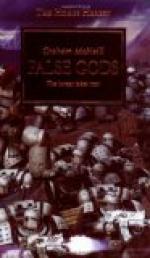Simpkins righted and lit the overturned lamp and lifted the unconscious woman into a chair. There he bound her, wrapping her about with the linen bandages, until she was quite helpless to move. The obsidian eyes of the mummy seemed to follow him as he went about his task. Annoyed by their steady regard, he threw a cloth over the face and sat down to wait for the woman to come back to life.
[Illustration]
[Illustration]
VII
Though her gown was torn and spotted with his blood, Mrs. Athelstone had never looked more lovely. But Simpkins was quite unmoved by the sight of her beauty. His infatuation for her, his personal interest in her even, had puffed out in that moment when he had discovered in the mummied face a likeness to Doctor Athelstone. He was regarding her now simply as “material,” and fixing in his mind each detail of her appearance, that he might the more effectively describe her in his story. And what a splendid one it was! The Blavatsky “spread,” with the opportunity which it afforded to ridicule two rather well-known women—that was good stuff; the scandal which had unfolded as he worked—that was better still; but this “mysterious murder,” with its novel features—this was the superlative of excellence in Yellow Journalism. “Talk about Teddy’s luck,” thought the reporter; “how about the luck of Simp., old boy?”
He looked at his watch anxiously. He had plenty of time—the paper did not go to press until two. Relieved, he glanced toward Mrs. Athelstone again. How still she was! She was taking an unreasonably long time about coming to! The shadows in the room began to creep in on him again, and to oppress him with a vague fear, now that he was sitting inactive. He got up, but just then the woman stirred, and he settled down again.
Slowly she recovered consciousness and looked about her. Her eyes sought out Simpkins last, and as they rested on him a flash of anger lit them up. Simpkins returned their stare unflinchingly. They had quite lost their power over him.
“So you’re a thief, Simpkins—and I thought you looked so honest,” she began at last, contempt in her voice.
“Not at all,” Simpkins answered, relieved and grateful that she had only suspected him of being a thief, that there had been no tears, no pleadings, no hysterics; “I’m nothing of the sort. I’m just your clerk.”
“Then, what are you doing here at this time of night? And why did you attack me? Why have you bound me?”
“I’ll be perfectly frank, Mrs. Athelstone.” (Simpkins always prefaced a piece of duplicity by asseverating his innocence of guile.) “I’ve blundered on something in there,” and he motioned vaguely toward the coffin, “that is reason enough for binding you and turning you over to the police, sorry as I should be to take such a step.”
“And that something?”
“The body of your husband.”




